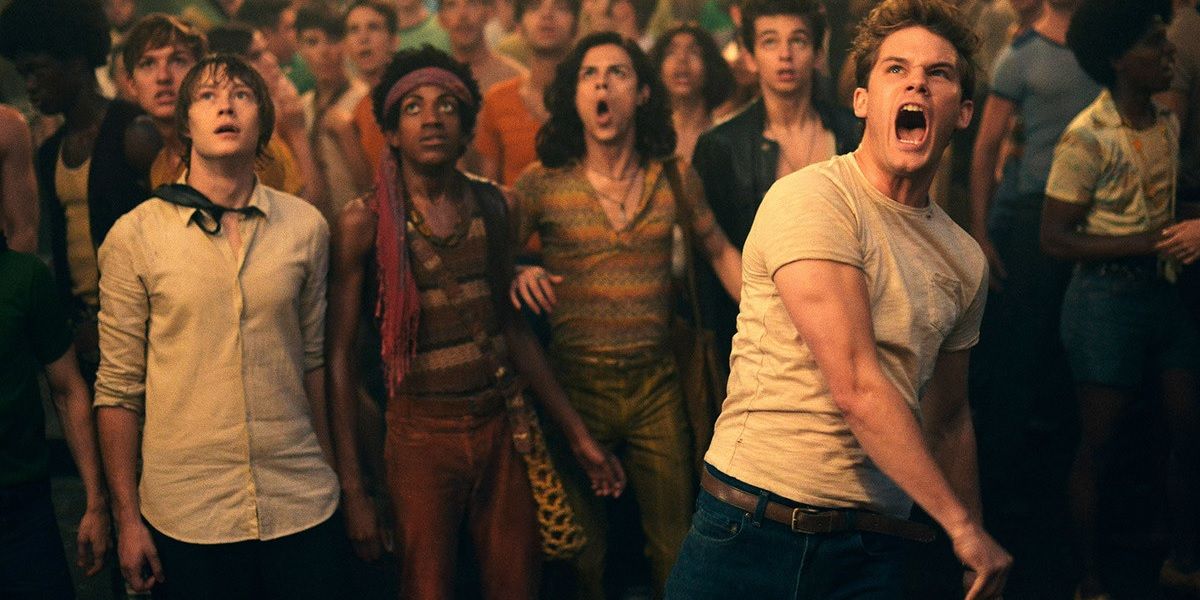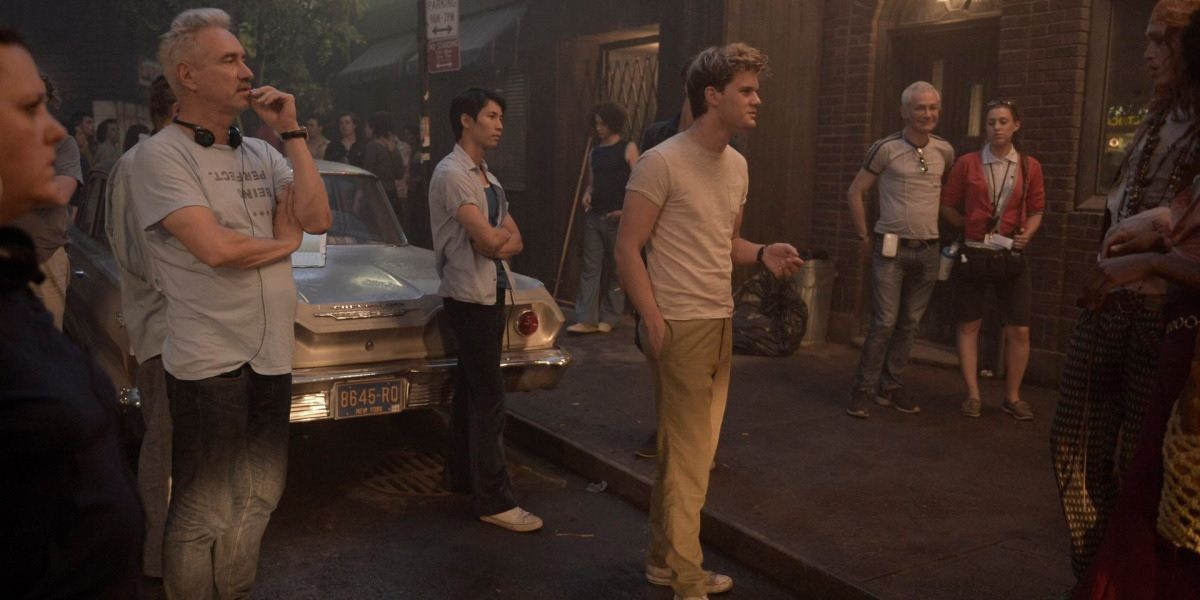"There is no such thing as a moral or an immoral book," Oscar Wilde wrote in his now-famous preface to The Picture of Dorian Gray. "Books are well written or badly written. That is all." There's certainly something to be said for Wilde's absolutist take on art and morality, but the idea of art having a moral responsibility is nonetheless the source of much discussion - whether it's a moral responsibility to make a comic book movie accurate to its source material, or a moral responsibility to make a historical film accurate to real life events.
The latter has been the subject of a number of notable controversies, the most recent of which is this week's flare-up of debate surrounding Roland Emmerich's historical drama Stonewall, which is based on the Stonewall riots of summer 1969. Though accounts of the riots vary, there are a few key figures widely recognized as being central to the initial events and the LGBT liberation movements that surrounded them, including gay rights pioneer Bob Kohler and trans activists Marsha P. Johnson and Sylvia Rivera. Emmerich's film, though it includes depictions of some of these people, is mainly focused on a fictional 18 year-old cisgender white kid called Danny (Jeremy Irvine), who comes to New York City after being kicked out by his parents and becomes the primary instigator of the riots.
Emmerich's justification for making a fictional character the figurehead of a historical drama was, as told to Buzzfeed, "As a director you have to put yourself in your movies, and I’m white and gay." The limitations of this rule are a little confusing, since at last glance Emmerich was not a buff 18 year-old midwestern American man with a chiseled jawline and great hair. Apparently one of the privileges of putting yourself into a movie is a bit of flattering embellishment.
Stonewall's attempt at using Danny as, in Emmerich's own words, "a very easy in" for straight audiences appears to have backfired, as the film has so far attracted an almost universal front of scathing reviews. Although Ava Duvernay's historical film Selma was far better received by critics (and, indeed, by the Oscars) upon its release last year, it was also the subject of impassioned debate over the portrayal of Lyndon B. Johnson and his role in the civil rights movement. The New Yorker's Amy Davidson suggested that the strength of this outrage may have stemmed from Selma lacking a usual ingredient in movies about the historical struggle against racism: "black Americans’ bestowal of loving gratitude on sympathetic white Americans who are willing to recognize their rights."
One of the problems with assigning the responsibility of historical accuracy to a dramatized retelling is that it's an impossible ideal. When making a biopic, for example, a filmmaker must look at the entire span of a historical figure's life and decide which collective two hours were the most important. That selection process will inevitably include bias on the part of the storyteller.
It can also be argued that total historical accuracy isn't even desirable, let alone required. When faced with criticisms of historical inaccuracy in The Imitation Game - specifically, Cumberbatch's version of Alan Turing naming his codebreaking machine after his boyhood love, Christopher - director Morten Tyldum explained that the change was a way of crystallizing the 'truth' of Turing's feelings towards his creation into something more immediately tangible for audiences.
"One thing that people have been saying is... it's not accurate that the machine he built was named Christopher. OK, here's the fact, though: the machine was inspired by Christopher. That we know for a fact. We know this because he wrote letters to Christopher's mom his whole life. We know that [because of] his obsession about recreating a consciousness, recreating something that he lost. That's his inspiration. The computer came out of that. So how do you communicate that on screen?
"By naming the machine Christopher, you're able to communicate that. You're able to communicate the importance of the machine, what it was for Alan. You're conveying the emotional truth by actually adding something that is fictional. I hold that the emotional truth is the most important one."
While at first glance this quote might seem to be a point in defense of Emmerich's take on Stonewall, it actually lends more weight to the criticisms of his film. The facts of the Stonewall riots are muddied by a lack of video footage and mixed witness testimony, but the uprising has become a clear symbol of hope and defiance for effeminate gay men, trans people, butch lesbians, sex workers, and others who were marginalized even within the boundaries of the already marginalized gay community. That is what Tyldum would call the "emotional truth" at the heart of the story.
Mark Segal, publisher of Philadelphia Gay News and one of the activists present during the Stonewall riots, was among those left underwhelmed by Emmerich's take on history. Segal explained that the problem isn't as simple as Stonewall having a white, gay main character. "I don't think any of us are offended by the idea of white and gay," he clarified. "I am white and I am gay and I was there." Rather, the issue is that Emmerich created a self-insert character to be the protagonist of a historical event at which he was not present, rather than choosing to focus the story on any one of the many real life activists who were present.
Segal also criticizes Stonewall for giving such fleeting attention to the year that followed the riots, during which the number of openly LGBT activists in New York leapt from around 100 to the thousands that joined the very first Gay Pride March in 1970.
"What really is important, especially to those of us that were there... is Gay Liberation Front. From the ashes of Stonewall we built Gay Liberation Front, [which] unified the LGBT community, and that's what's important here: LGBT community. For the first time anywhere in the nation, all elements of the LGBT community united to form one organization. And we're talking about people who had drastically different political views. We have trans people, we have gay youth, we have lesbian separatists - all coming together under one roof to discuss what needs to be done.
"Once we have that the first thing on our agenda was beginning, for the first time in history, to define ourselves rather than allowing society to define us. We then became the first in-your-face LGBT organization saying, 'It's not what you think of us' to society. 'It's what we're demanding for us, not pleading or asking, but demanding because we're all human beings.'"
One of the aspects of Stonewall that has caused perhaps the most affront to the LGBT community is Emmerich's open admittance that he gave the movie a handsome, white, "straight-acting" all-American main character in order to make the story more marketable to straight people. Speaking to Metro, Emmerich explained:
"I was constantly thinking how could you tell a story of that time so people today could still relate to it... When you make gay films everybody says it's for gay people, but no it's not. The majority is straight, and I'm curious how many straight people will go and see it. I hope a lot of them."
This quote, more than anything, seems to encapsulate why Stonewall has elicited so many angry responses. The riots and the activism that followed were emblematic of LGBT people refusing to be bullied and dismissed merely because they made straight people feel uncomfortable. By inventing a protagonist whose express purpose is to make straight people feel more comfortable about all the trans characters and people of color in the supporting cast, then telling LGBT people that their minority status makes them not worth catering to, it's little wonder that Emmerich's take on Stonewall has been treated as a betrayal.
Stonewall releases in theaters on September 25th, 2015.




